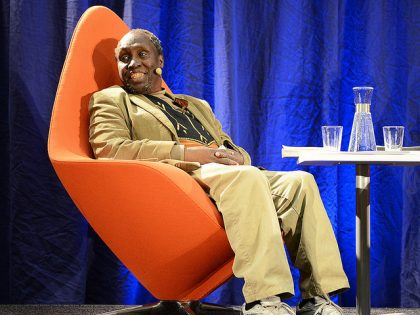Ghanaian Facebook Proverbs
No, Albert Einstein never said this on Facebook: “Having an okro mouth does not mean you will be given banku to go with it.”

Image by Selorm Jay.
Surely the American actress Marilyn Monroe never quoted the Akan proverb: “Never laugh at the sloppiness of your mother-in-law’s breast; your wife’s may turn out to be just like that when she grows older”; neither did a young Angela Merkel, long before becoming German Chancellor, ever retort that “Fermented sobolo never got anyone drunk” at the 1972 Oktoberfest! But you would be forgiven for even wondering if either attribution were true had you chanced upon Ghanaian social media spaces just over two years ago.
Ghanaian’s on Facebook and other social media platforms post innovative works, misattributing quotes to well-known figures (who are mainly from the geopolitical West) to create humorous collaborations with their Ghanaian readers, questioning the authority of said geopolitical western figures, and challenging their audience to think about what is assumed to be true. This has evolved from a particular context: a significant portion of the population has access to the Internet, and shares a cultural history and present that demand a fine-tuned sense of irony – an irony that mocks popular “western” figures and the “superior fonts of wisdom” attributed to the West as a whole.

It all started in November 2013 when the Ghanaian writer, Nana Awere Damoah posted on Facebook: “Never introduce your child to the delights of the tilapia head until he or she is old enough to buy for himself or herself – Abraham Lincoln”. A Ghanaian journalist named Abubakar Ibrahim followed suit, also on Facebook: “having an okro mouth does not mean you will be given banku to go with it – Albert Einstein.”
Both Damoah and Ibrahim posted these quotes for their obvious humour. Their respective Facebook communities, mainly other Ghanaians, responded with comments acknowledging the disjunctions. After all, from a Ghanaian (and probably any other) point of view it is hilarious to imagine a 19th-century American president with no known connection to West Africa extolling the virtues of savoring the head of a tilapia (which is a very Ghanaian thing to do). Equally ridiculous is the notion of Einstein idiomatically connecting an “okro mouth”, which signifies gossip (due to the slimy and slippery nature of okro soup) to banku, a staple food which accompanies okro soup (yum).

Similar to #WhatWouldMagufuliDo trending across East Africa, these posts spurred a chain reaction that went viral on Ghanaian Facebook and Twitter for several months, as users creatively poked fun at famous figures and criticized issues of national interest. These posts were made up not only of Ghanaian proverbs misattributed to a famous person or fictional quotes misattributed to famous people, but also included common Ghanaian parlance misattributed to famous names and modified quotes from actual authors.
Posts like these were marked by the hashtag #GHCoats, made up of “Ghana” and “Quotes”. (While the “GH” is straightforward, the replacement of “quote” with “coat” is an inside joke for those familiar with Ghanaian phonetics. The play on words also plays with the habits of the bourgeois – who, in Ghana, are associated with formal dressing, including wearing “coats” (quite humorous when you consider the tropical weather inherent to the country – for more satire on this, see the prose of Ayi Kwei Armah in Fragments and the poetry of Kofi Awoonor in “We Have Found a New Land”).


Ultimately, Damoah compiled the innovative Facebook attributions into a free e-book called My Book of GHCoats. My Book of GHCoats can be called conceptual poetry, which is an avant-garde form of literature that comes into being when a poet compiles different pieces of information from various places into a single piece. Thus, we can think about questions relating to authorship, audience and collaboration, all in the context of their relationship with social media.



